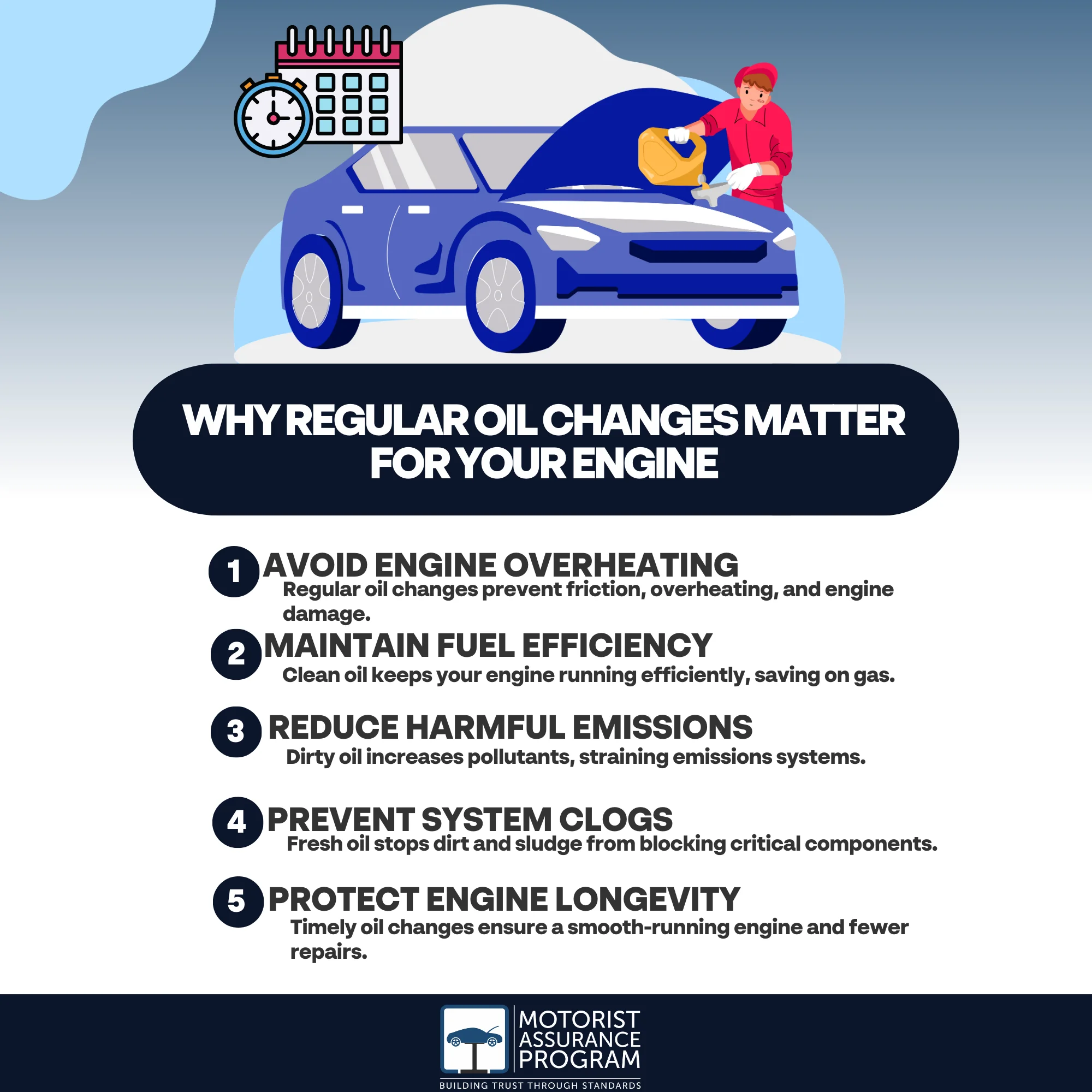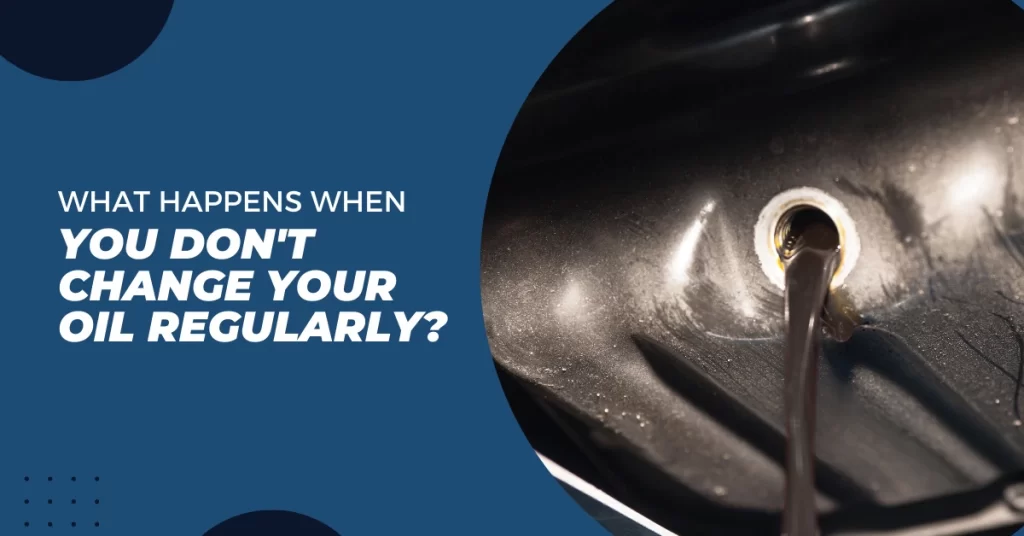When you don’t change your oil regularly, you risk severe engine damage. Old oil breaks down, leading to increased friction and overheating, causing wear on critical components. Your vehicle’s performance drops, fuel efficiency declines, and emissions rise due to sludge build-up. As dirt clogs the system, lubrication decreases, which can even damage turbocharged engines. Ignoring oil changes can void your warranty and hurt your vehicle’s resale value. In short, neglecting this maintenance task can lead to costly repairs and a shortened vehicle lifespan. There’s much more to uncover about maintaining engine health effectively.

Key Takeaways
- Skipping oil changes increases engine wear, leading to costly repairs and potential engine failure over time.
- Neglected oil causes reduced fuel efficiency, resulting in higher operational costs at the pump.
- Old oil can lead to overheating, damaging internal components, and shortening the vehicle’s lifespan.
- Contaminants in neglected oil contribute to increased emissions, straining the emissions system and harming air quality.
- Incomplete maintenance records from missed oil changes can lower your vehicle’s resale value and buyer trust.
Overheating
When your engine starts to overheat, it can be a warning sign that you shouldn’t ignore, as it often indicates underlying issues that could lead to serious damage. A common cause of overheating is inadequate lubrication, which is why it’s important to change your oil regularly. Fresh oil maintains ideal engine temperature by reducing friction and dissipating heat.
If you neglect oil changes, the oil can break down and become less effective at lubricating engine components. This can lead to increased friction, resulting in excessive heat. Over time, overheating can warp engine parts, damage gaskets, or even cause a complete engine failure.
You might also experience a drop in oil pressure if your oil is dirty or depleted. This further exacerbates overheating issues, creating a vicious cycle that can be costly to repair.
Regular oil changes not only help maintain the correct operating temperature but also improve engine performance and longevity. By prioritizing this simple maintenance task, you can prevent overheating and protect your investment in your vehicle. So, don’t wait until it’s too late—stay proactive with your oil changes!
Reduced fuel efficiency
Your vehicle’s performance can greatly decline if you neglect regular oil changes, leading to reduced fuel efficiency. When you don’t change your oil regularly, it can become contaminated with dirt and debris, making it less effective at lubricating the engine. This causes the engine to work harder, which directly impacts fuel consumption. You might notice you’re filling up more often, and that’s not just your imagination; it’s a real consequence of poor oil maintenance.
So, how often should you change your oil? While the general guideline used to be every 3,000 miles, many modern vehicles can go between 5,000 and 7,500 miles—sometimes even longer if you’re using synthetic oil. However, this can vary based on your driving habits and the type of oil you use. If you primarily drive in stop-and-go traffic or extreme temperatures, you might need to change it more frequently.
Keeping up with regular oil changes not only enhances your vehicle’s performance but also helps maintain ideal fuel efficiency, saving you money at the pump in the long run. Don’t ignore this vital aspect of vehicle maintenance!
Increased emissions
Regularly neglecting oil changes can lead to increased emissions from your vehicle. When you don’t change your oil as frequently as you should, contaminants build up in the engine oil. These contaminants can create excessive friction, causing your engine to work harder. Consequently, your vehicle’s emissions system struggles to keep up, releasing more harmful gasses into the atmosphere.
But how often does oil really need to be changed? It varies based on your vehicle’s make, model, and driving conditions. Generally, most manufacturers recommend changing your oil every 5,000 to 7,500 miles, though some newer vehicles can go even longer. Ignoring these recommendations not only affects your engine’s efficiency but also impacts air quality. Increased emissions contribute to pollution, which can harm the environment and public health.
Systems will clog with dirt and debris
Neglecting oil changes can lead to more than just increased emissions; it can also cause essential systems in your vehicle to clog with dirt and debris. When you don’t change your oil regularly, the oil breaks down and loses its ability to lubricate effectively. This allows contaminants like dirt, metal shavings, and sludge to accumulate, forming a thick, sticky residue that obstructs critical components such as the oil filter and the oil passages.
As these systems become clogged, oil circulation slows down, resulting in inadequate lubrication for your engine parts. Over time, this can lead to overheating and excessive wear, ultimately reducing your engine’s lifespan. You might notice reduced performance, strange noises, or even warning lights on your dashboard.
Ignoring regular oil changes not only affects the engine but can strain other systems in your vehicle, leading to costly repairs down the line. To avoid these issues, make it a habit to stay on top of your oil changes. Understanding what happens if you don’t change your oil regularly is essential for maintaining your vehicle’s health and ensuring a smooth driving experience.
Turbos can fail and destroy your engine
When oil changes get pushed aside, it can lead to serious consequences for your turbocharged engine. Turbos rely on clean, high-quality oil to lubricate their moving parts and manage heat. When you neglect regular oil changes, the oil can become contaminated and lose its effectiveness. This puts excessive strain on the turbo, leading to overheating and potentially catastrophic failure.
A failing turbo can send metal shavings and debris into your engine, causing further damage and costly repairs. So, how often does oil need to be changed? Most manufacturers recommend changing your oil every 5,000 to 7,500 miles, but this can vary based on your driving habits and the oil type used. If you frequently drive in stop-and-go traffic, tow heavy loads, or operate in extreme conditions, you might need to change your oil more often.
Ignoring oil change intervals can not only ruin your turbo but also compromise your engine’s overall health. Regular oil changes are essential for maintaining the integrity of your vehicle and ensuring a smooth, reliable driving experience. Don’t risk your engine’s life—stay on top of your oil maintenance!
Worse performance
Oil changes directly impact your vehicle’s overall performance, especially when it comes to your engine’s efficiency and power delivery. When you neglect regular oil changes, the oil becomes contaminated and loses its lubricating properties. This leads to increased friction between engine components, causing them to work harder than necessary. As a result, your engine’s power output diminishes, and you might notice sluggish acceleration and reduced responsiveness.
Furthermore, old oil can’t effectively remove contaminants and debris, allowing harmful particles to circulate within the engine. This can cause wear and tear, leading to potential engine damage over time. You may also experience decreased fuel efficiency, as a struggling engine consumes more fuel to maintain performance.
To avoid these issues, it’s important to know how often to change regular oil, typically every 3,000 to 7,500 miles, depending on your vehicle and oil type. Regular maintenance guarantees your engine runs smoothly and efficiently, keeping your vehicle’s performance at its best. Don’t ignore oil changes; they’re essential for maintaining your engine’s health and overall driving experience.
Voiding your warranty
Regular oil changes are crucial not just for your engine’s performance but also for maintaining your vehicle warranty. If you don’t change your oil every recommended interval, you could void your warranty, leaving you responsible for costly repairs. Manufacturers often specify maintenance schedules, including oil changes, to guarantee that their vehicles operate at peak efficiency. Failing to adhere to these guidelines can be viewed as neglect, and any engine issues that arise may not be covered.
When you don’t change your oil every 3,000 to 7,500 miles, depending on your vehicle, dirt and debris accumulate, leading to increased wear and tear. This can result in engine failure, which is a significant concern if you’re relying on your warranty for repairs.
Additionally, if you ever need to file a warranty claim, you’ll likely need to provide proof of regular maintenance. Without documented oil changes, your claim could be denied, leaving you with a hefty repair bill. Protect your investment by staying on top of your oil change schedule, guaranteeing that your engine remains healthy and your warranty stays intact.
Reduced resale value
Skipping oil changes can greatly reduce your vehicle’s resale value. When potential buyers see a history of neglected maintenance, they may question the overall condition of your car. Here are three ways failing to change oil as required can affect your resale value:
- Increased Wear and Tear: Without regular oil changes, your engine can suffer from excessive wear, leading to costly repairs that scare off buyers.
- Poor Performance: An engine that hasn’t received proper lubrication will not perform at its best. Buyers often seek reliability, and a poorly running engine is a red flag.
- Diminished Trust: Buyers are likely to be wary of vehicles with incomplete maintenance records. They may perceive a lack of care, translating to a lower offer.
To maximize your vehicle’s resale value, always adhere to the change oil required schedule. Regular oil changes not only keep your engine healthy but also signal to potential buyers that you’ve taken good care of your vehicle. Remember, a well-maintained car retains its value considerably better than one that’s been neglected. Prioritize oil changes to protect your investment!
Frequently Asked Questions
How Often Should I Change My Oil?
You should change your oil every 3,000 to 5,000 miles, depending on your vehicle’s make and model. Regular changes keep your engine running smoothly and extend its lifespan, ensuring peak performance and efficiency.
What Oil Type Is Best for My Vehicle?
Choosing the right oil’s like picking a soulmate; it’s got to match! Check your owner’s manual, consider the climate, and don’t forget synthetic options! Trust me, your engine will thank you for the perfect match!
Can I Go Longer Between Oil Changes?
You can extend oil change intervals, but it’s essential to monitor your vehicle’s performance and manufacturer recommendations. Regular checks guarantee ideal function and longevity, preventing potential issues that could arise from neglecting maintenance. Stay informed!
What Are the Signs My Oil Needs Changing?
You’ll notice signs like a dark, gritty appearance, unusual engine noises, or a warning light. If your oil smells burnt or your mileage exceeds recommended intervals, it’s time to get it changed. Stay proactive!
Does Oil Change Frequency Affect Engine Lifespan?
Sure, you can ignore oil changes, but your engine might just start auditioning for a horror movie! Regular oil changes keep your engine running smoothly, ultimately extending its lifespan and saving you costly repairs down the road.
Conclusion
Neglecting regular oil changes can turn your engine into a ticking time bomb, where heat rises like a fiery phoenix, and efficiency plummets like a stone. As dirt and sludge swirl through your system, they choke on your vehicle’s performance, leaving it gasping for breath. Don’t let your warranty slip through your fingers or watch your resale value nosedive. Embrace a routine oil change, and keep your engine purring like a content cat, ready to conquer the road ahead.


